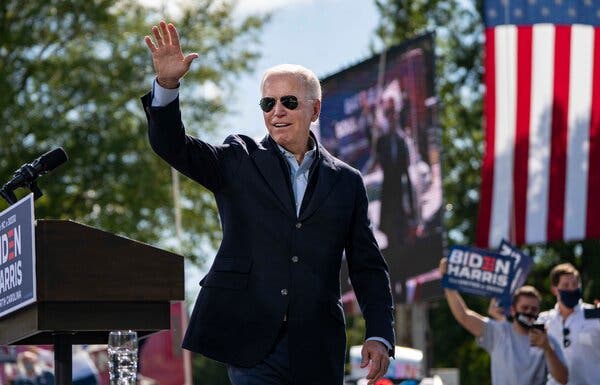
Alex Hertel-Fernandez is an assistant professor in Columbia University’s School of International and Public Affairs. He is also the author of “State Capture: How Conservative Activists, Big Businesses, and Wealthy Donors Reshaped the American States — and the Nation.” I asked him to explain how conservatives had reshaped the politics of American states.
Q. Your book talks a lot about ALEC, the conservative American Legislative Exchange Council. What is it?
A. The American Legislative Exchange Council, or ALEC, is a network of state legislators, conservative philanthropies and wealthy donors, right-leaning advocacy groups, and private-sector businesses that drafts and disseminates “model bill” proposals for state legislation. Given ALEC’s members, these model bills tend to advance conservative, pro-business priorities. The organization was launched in the 1970s, substantially revamped in the late 1980s, and has enjoyed growing success in terms of its membership and legislative victories throughout the 1990s and early to mid-2000s. At its peak in the mid-2000s, ALEC could claim around a fourth of all state legislators as members, alongside hundreds of large Fortune 500 companies and major conservative advocacy groups (like the NRA) and philanthropies (like the Bradley Foundation).
In my opinion, journalistic and political coverage of ALEC has often mischaracterized the group — for instance, describing it as simply a front group for big businesses or an appendage of the Koch brothers’ political network. But it’s much more of a political coalition: It includes many large businesses, yes, as well as wealthy individual donors and their philanthropies. It also has included throughout its history many social conservative advocacy groups and libertarian organizations. Balancing these diverse interests was not always an easy task, and one reason I think ALEC has had such staying power over the decades since the 1970s has been its ability to come up with organizational tactics for adjudicating conflicts between its members.
Q. According to your research, how has ALEC affected legislation in American states?
A. ALEC, alongside other allied cross-state conservative groups, has played an important role in reshaping state policy in a number of different areas. ALEC has been a major opponent of the Affordable Care Act, and has helped conservative legislators undermine the implementation of the health reform program, above all stymieing expansion of Medicaid to cover previously uninsured poor adults. In labor policy, ALEC has championed major cutbacks to the power of unions, especially in the public sector. It has also helped to popularize the strategy of state legislative preemption, in which conservative state governments can block liberal cities from passing measures that exceed state policy on the minimum wage, environmental standards and paid sick and family leave, for instance. On environmental policy, ALEC has been at the forefront of efforts to roll back state renewable energy requirements. And in fiscal and tax policy, ALEC has pushed states to enact major cutbacks in taxes and public revenue.
Q. Why has ALEC been so successful in influencing state legislators?
A. As I document in “State Capture,” ALEC has taken advantage of the fact that most states do not give their legislators much in the way of resources to consider and pass legislation. In many states, legislators meet for a few months a year, have few, if any, full-time staff, and are paid a part-time salary. And more generally, while most state legislators are elected as “conservatives” or “liberals,” they generally do not have a specific legislative agenda in mind to pursue once in office. Under these conditions, legislators are hungry for bill ideas and research assistance and help to develop and enact a legislative agenda. That’s exactly what ALEC has done.
Much of the journalistic and political coverage of ALEC tends to focus on the model bills themselves — the fact that ALEC makes it very easy for state legislators to quite literally copy and paste these proposals into law. But the model bills are only part of the story. ALEC also provides research help for bill development, political strategy and talking points, and even the witnesses the legislators can call to testify on behalf of a bill. Beyond these immediate services, ALEC fosters a network through its regular convenings that establishes social bonds between its legislative and its staff and other corporate and advocacy members. Through both its network and bill support services, ALEC has helped to define what it means to be a pro-business, conservative legislator.
Q. How does ALEC work together with other conservative state based organizations, such as the State Policy Network and the Koch-funded Americans for Prosperity?
A. ALEC does not operate alone, and in recent decades has been buttressed by two other cross-state conservative groups that complement ALEC’s strategies: the State Policy Network and Americans for Prosperity. These three organizations do different things and represent distinct constituencies, but often are pushing in the same direction on policy.
The State Policy Network is a network of state-level conservative, pro-business think tanks that produce research reports, media commentary and testimony on behalf of many of the same bills that ALEC drafts. The close coordination between the Network and ALEC is no coincidence: One of ALEC’s early executive directors recognized that ALEC would be more successful if it had outside support, and so opened his donor list to the precursor to the State Policy Network and got think tanks participating regularly in ALEC meetings.
Americans for Prosperity (AFP) is the newest of the three organizations but in many ways has become the most significant. Created and directed by the Koch brothers’ political network, it is a federated advocacy group that spans both electoral work and policy lobbying, with a presence in local-level government (city councils and even school boards), state government, Congress and presidential elections. As Theda Skocpol and I have explained, AFP in some ways resembles a political party: It has local field offices in key battleground counties, state offices, regional offices and a national headquarters that together direct some 3 million grass-roots volunteers and hundreds of millions of dollars in electoral and legislative campaigns. But AFP is not a free-standing party, and instead has historically worked through the Republican Party: helping to elect very conservative GOP politicians and then lobbying them to pursue a conservative free-market agenda. AFP also works closely with ALEC, especially on issues that involve rolling back labor rights and the power of unions, business regulations and taxes and government spending.
Q. Why is there no successful left or liberal counterpart to ALEC?
A. ALEC was ironically created because conservatives felt that liberals had all the cross-state clout in the 1970s — especially with the rise of public-sector labor unions that were politically powerful and organized along federated lines. But since ALEC’s rise, liberals have been much less successful in creating a nonlabor counterweight for their side.
It’s not for a lack of trying: In the book I count at least six instances in which left-wing political entrepreneurs tried to create organizations that could counter ALEC. Instead, these organizations were often unable to get donor interest or support from political elites, who were far more focused on national politics than on the states. When their attention did shift to the states — when Democrats lost control of the federal government — the attention tended to be fleeting, and progressive donors often created new organizations that competed with one another instead of complementing one another’s work. And in the few instances when left-leaning organizations did get off the ground, they tended to focus their energy on states with strong progressive bases already in place. The lesson from ALEC’s history is that building cross state networks requires sustained donor and elite support over many years, and organizing across the entire country — not just states already favorable to the cause.


